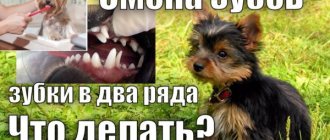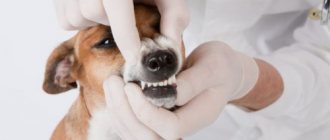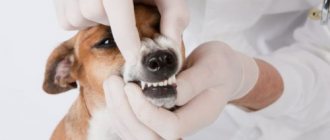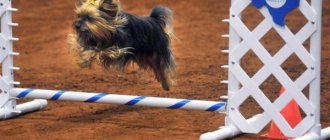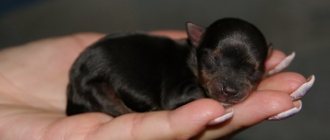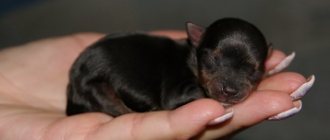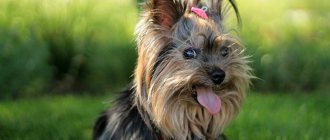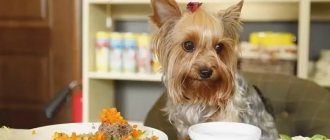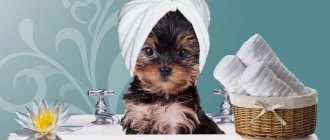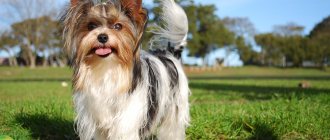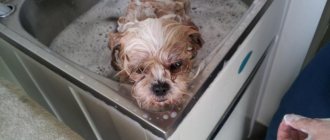Healthy teeth and correct bite in a Yorkie are not only a sign of good health of the dog, but also a source of pride for its owner. Unfortunately, not all Yorkies can boast of even, snow-white fangs. If your pet is not looked after too carefully, its teeth become covered with plaque, which over time hardens and turns into tartar.
And problems during the change of teeth in puppies of this breed are not uncommon. Therefore, in order for the dog to develop a correct bite, you need to carefully monitor how the teeth change so as not to miss possible deviations.
Features of the structure of the Yorkie's jaw
By the end of the development of the skull, the Yorkie should have 42 teeth: 20 in the upper jaw, 22 in the lower. Yorkie teeth classification:
- incisors;
- fangs;
- premolars;
- molars.
If a dog is missing at least 1 tooth, you can forget about a show career. A professional judge cannot give preference to a dog with an incomplete set.
What to watch out for
Unlike molars, baby teeth in puppies very rarely cause problems. Despite this, veterinarians still recommend not to let down your guard and closely monitor your pet’s well-being. The following symptoms are characteristic of teething:
- increased salivation;
- redness and swelling of the gums;
- severe itching at the site where a new tooth appears;
- deterioration of sleep and appetite;
- slight and short-term increase in temperature;
- lethargy or irritability.
The most important problem that worries all babies is itchy sensations in the mouth. If your pet chews everything in sight, then buy him a safe alternative. To relieve itching, special teethers with a cooling effect are suitable, as well as any chewing toys for dogs: ropes, bones or funny rubber chickens.
NOTE!
Do not leave your baby unattended and be sure to hide all potentially dangerous things to prevent electric shock due to chewing wires.
While symptoms persist, it is better to switch your four-legged pet to a gentle diet that excludes solid food. With natural feeding, liquid porridge should be left on the menu, and with dry feeding, food soaked in water and canned meat should be left on the menu.
Other possible problems include:
- Purulent inflammation, or abscess. Without timely treatment, it can grow into adjacent gums and cause displacement of teeth.
- Pericoronitis, or inflammation of the gingival hood. Inflamed soft tissue hangs over the new tooth and prevents its natural eruption. Because of this, it either rots or makes its way through another path, changing the shape of the bite.
- Persistence. Milky roots gradually dissolve. If you do not notice any loss at the age of 4 months, take your baby to the doctor. This situation is typical for persistence, when two rows of teeth are present in the oral cavity at once. This violation is fraught with caries and destruction of enamel, which, in turn, can lead to periodontal disease and periodontitis. The problem is solved by surgical removal under sedation.
If you notice any alarming symptoms, seek help immediately and do not try to get rid of breast milk on your own. This can lead to malocclusion.
Bite
The normal bite of a Yorkie is a scissor bite. The following are considered deviations from the breed standard:
- snack (progenia);
- undershot (prognathia);
- direct jaw bite.
Some diseases, partly hereditary, lead to improper formation of the lower part of the skull. If they are detected in time, the dog's bite can be saved.
Attitude towards children and pets
Yorkies do not always get along with other dogs due to their innate tendency to dominate..
However, they get along well with dogs and even lumps if they grew up with them.
Representatives of this breed only dislike rodents - rats and mice have always been objects of hunting for Yorkies.
These dogs get along well with children . They are united by curiosity and activity and enjoy spending time together.
When does a Yorkie change teeth?
All Yorkshire terriers change milk cycles at approximately the same time. By this sign you can even determine the age of the dog. The dog is born completely toothless. By 1-1.5 months the mammary row begins to emerge, by 4 months the molar row breaks through, and by 8 months a complete set is formed.
| Age: | Condition of the oral cavity: |
| up to 3-4 weeks | no teeth |
| older than 3-4 weeks | 2 milk fangs |
| 4-5 weeks | incisors and premolars |
| 3-5 months | first indigenous |
| 6-7 months | completion of the formation of the root series |
It is considered normal if the mammary row has not completely changed to the primary row before 8 months. If the 8th month has passed, and the teeth are not all molar, the Yorkie needs to be shown to the veterinarian.
What are they?
The dog's dental system consists of incisors, canines, false roots and molars, as well as premolars and molars. The first premolars are deciduous and are replaced by permanent ones at the age of 4-5 months. But molars are only permanent and are absent in puppies.
In total, adult dogs have the following set of teeth:
- Twelve incisors (6 each on the upper and lower jaws).
- Four fangs (2 on each jaw).
- Sixteen premolars (8 each above and below).
- Ten molars (4 on the upper and 6 on the lower).
The first of the premolars, located immediately behind the canine, is usually very small in size; it also happens that in place of one of these teeth, a dog grows two.
Common problems
The Yorkshire Terrier is a dog with dental problems, so a lot of difficulties arise. Let's try to understand the reasons that lead to jaw diseases:
- Poor nutrition. Lack of calcium and other mineral supplements negatively affects the development of the baby's jaws. If you feed your pet dry food, then you should look for an option with a large number of additives. And if you feed natural food, then consult a veterinarian about mineral feeding.
- Traumatic games. A baby's gums can be damaged by sharply tugging on a toy that is in his mouth. Be careful with fun.
- Genetics. Before purchasing a puppy, always examine the mother and father. There is almost a 100% chance of a puppy being born with minor jaw defects, if the parents have any.
- Soft food. Choose food that puts stress on the jaws. Active jaw work stimulates the replacement and strengthening of teeth. Drying is preferable in this regard.
We have sorted out the reasons that can lead to improper formation of fangs, now let’s move on to pressing problems.
Side effects
Molars should grow in place of milk teeth. If this does not happen, the cause is sought in poor nutrition or genetic diseases.
A pet can grow several permanent fangs at once next to the milk ones. An abnormal number of incisors in the jaw leads to deformation of the bone tissue.
For your information! Teeth can become deformed due to a lack of calcium in the body or head injuries.
A dog's teeth grow in 2 rows
Remnants of food and infection become clogged into the hole of the fallen root; this can lead to suppuration of the gums and an inflammatory process. In the worst case, the Yorkie will lose adjacent teeth. Inflammation causes discomfort for the dog, and restless behavior is a symptom of pain.
Delayed tooth change
Dwarf dog breeds face a problem when the root row has already erupted, but the milk row has not yet fallen out. This is caused by the incorrect location of the rudiment, and to it – the miniature size of the jaws.
A delay in the change from the deciduous row to the molar row leads to polyodontia, and in advanced cases to malocclusion. The disease is fraught with consequences: ingrown fangs injure the dog’s oral cavity, leading to the formation of ulcers and severe pain.
Fact: Dogs weighing more than 2.5 kg are less likely to suffer from polyodontia.
Removal of milk
Incorrect positioning of teeth is not only a spoiled appearance. These include digestive problems, but also damage to the dog’s tongue and gums. To prevent this from happening, retained baby teeth must be removed in a timely manner. To do this, it is best to go to a veterinary clinic, where the doctor will easily and painlessly relieve your pet of this problem. This is a quick and uncomplicated procedure that is performed under local or general anesthesia. In order to eliminate the possibility of complications, it is recommended to examine the animal before the procedure and carry out the necessary tests.
Malocclusion
A non-standard bite develops during the period of change from the deciduous to the molar. The main reason is a lack of calcium, as well as soft food, which poorly develops the chewing muscles.
How to correct an overbite in a Yorkie
Malocclusion in dogs is treated in the same way as in humans. Special staples, braces, and mouth guards are used. Let's say right away: the pleasure is not cheap. Devices for correcting malocclusion are divided into:
- removable:
- non-removable.
Mouth guards are new in the field of veterinary orthodontics. They are removable and change every couple of weeks. To install them, a one-time anesthesia is used to make an impression of the dog’s jaws. Afterwards, acrylic mouth guards are issued, which are worn for as long as possible. It is permissible to take them off while eating, playing, or walking.
Braces, on the other hand, can only be removed and put on by a veterinarian. Braces have a number of contraindications, such as: ulcers, periodontitis, allergies, etc. Plus, you need very careful care of the oral cavity while wearing braces.
Advantages and disadvantages
In addition to their compact size, which allows Yorkies to feel comfortable living even in small apartments, and visual appeal, representatives of this breed have many more advantages:
- devotion and loyalty to the owner;
- ability to get along with children;
- ability to learn;
- friendliness, lack of anger or aggression;
- intelligence, intelligence and the ability to make independent decisions, assessing the current situation.
An important fact is the absence of undercoat in Yorkies and, accordingly, shedding, as well as the hypoallergenic nature of their coat.
NOTE!
Before purchasing a dog, allergy sufferers need to find out what exactly provokes an allergic reaction: if the problem is in the animal’s skin secretions, they should not buy a Yorkie.
Yorkies also have disadvantages, including:
- intolerance of loneliness;
- the need for careful and expensive care;
- imperfect digestive system, requiring a special diet;
- tendency to allergies.
Read more about the pros and cons of the breed here.
Yorkies also require clothing and shoes for walking in the cold season (shown in the photo).
Care
Get your puppy used to brushing his teeth from a young age. Train him to show his fangs and not be afraid, but do not put your fingers in the gums until the baby fangs appear.
- Buy a brush for small dogs (or a brush for small children) and a special paste at the pet store.
- Apply a small amount of paste to the brush.
- Calmly and gently begin brushing a couple of teeth. If you have trained your Yorkie well, he will not resist the procedure.
- To make cleaning enjoyable and beneficial for your pet, treat him with a small treat at the end of the procedure.
Important: do not use pastes on people. York could accidentally ingest it and become poisoned.
Visit to the veterinarian
The sooner your Yorkie starts visiting a canine orthodontist, the faster he will get used to dental procedures. The doctor will remove baby canines and incisors, install a device to straighten the teeth, correct the bite, and give recommendations for cleaning the pet’s mouth.
The dog is shown to the doctor even before the temporary teeth are replaced. The specialist will assess the condition of the animal’s jaw and give a forecast about the Yorkie’s future bite.
An adult is taken to the clinic 2 times a year to have tartar cleaned. Deposits are removed using a laser; the operation is painless.
Yorkshire Terrier at a doctor's appointment
Is it possible to replace brushing your Yorkie's mouth with treats?
Promotions of various dog treats will not leave anyone indifferent. They are said to completely clean the incisors and promote oral hygiene. This also applies to dry food. It is a mistake to believe that since dry food promotes jaw development, then the dog does not need anything else. This is only partly true, because no amount of treats or bones can replace brushing your teeth.
At least once every week or two, thoroughly clean your Yorkie's mouth. This will help avoid bad breath, tartar formation and yellow plaque. And for extra care, use vet-approved treats.
How to brush your teeth at home
Brushing your teeth often causes negative emotions in dogs (including Yorkies). To reduce stress in your pet and carry out cleaning as effectively as possible, you need to follow these instructions:
- The dog is fixed: seated or placed on the table.
- The owner says the command “Show your teeth.”
- It is better to carry out the procedure with an assistant, then one person will do the cleaning, and the second will encourage and calm the pet.
- Veterinarians advise brushing the back teeth first, and then moving on to the front teeth. It is easier for a dog to tolerate it when a person pulls its lips back rather than lifting its nose.
- First you need to brush along the outside, especially the area near the gums, because this is where tartar appears.
- Then you should clean the inside of your teeth.
- There is no need to try to brush all your teeth at once. It is better to gradually expand the area of influence so as not to scare the pet.
Innodent Repair™
Manufacturer:
Bachem AG, Switzerland, according to GMP standards
Package:
1 bottle
Storage:
Store InnoDent™ Repair in the freezer (-15°C or below).
Transportation:
Delivery within the city without refrigerant in cold weather is allowed. During the warm season and when transporting long distances - delivery in polystyrene foam with refrigerant.
Innodent in dental practice.pdf Treatment of caries in children with InnoDent.pdf Swiss raw materials for the treatment of caries without pain
Submit your application
Advantages of visiting Dr. Martin dentistry
The network of dental clinics "Doctor Martin" was awarded the honorary title of dentistry with European quality of treatment. Despite this, the pricing policy is loyal, the cost of the services provided is affordable, discounts and special offers are regularly held (more details on the price list can be found on the website). Every patient is guaranteed free consultations.
To make an appointment with a specialist, you can contact the administrator at the numbers provided or leave a request on the website. At the initial appointment, the doctor will collect an anamnesis, conduct an examination,, if necessary, prescribe a diagnosis and tell you how to save a loose tooth in a particular case. Thanks to the extensive experience and highly qualified specialists, it is possible to cope with even advanced clinical situations. Don't delay, make an appointment right now!
